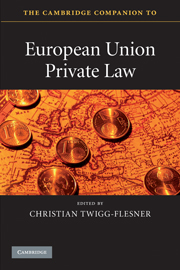Book contents
- Frontmatter
- Contents
- Preface
- List of Contributors
- Table of cases
- Table of legislation
- 1 Introduction
- 2 The historical evolution of European private law
- 3 European private law and the comparative method
- 4 The role of the conflict of laws in European private law
- 5 Competence and European private law
- 6 Language and terminology
- 7 European private law by directives
- 8 The European Court of Justice as a motor of private law
- 9 European contract law
- 10 The way forward in European consumer contract law
- 11 Commercial contracts and European private law
- 12 European tort law
- 13 European Union property law
- 14 Information obligations and withdrawal rights
- 15 Travel law
- 16 Unfair contract terms
- 17 Unfair commercial practices and European private law
- 18 Consumer sales and associated guarantees
- 19 Product liability
- 20 Commercial agency in European Union private law
- 21 EU competition law and European private law
- 22 Non-discrimination and European private law
- 23 Financial services in European Union private law
- Further reading
- Index
9 - European contract law
The Common Frame of Reference and beyond
Published online by Cambridge University Press: 05 July 2015
- Frontmatter
- Contents
- Preface
- List of Contributors
- Table of cases
- Table of legislation
- 1 Introduction
- 2 The historical evolution of European private law
- 3 European private law and the comparative method
- 4 The role of the conflict of laws in European private law
- 5 Competence and European private law
- 6 Language and terminology
- 7 European private law by directives
- 8 The European Court of Justice as a motor of private law
- 9 European contract law
- 10 The way forward in European consumer contract law
- 11 Commercial contracts and European private law
- 12 European tort law
- 13 European Union property law
- 14 Information obligations and withdrawal rights
- 15 Travel law
- 16 Unfair contract terms
- 17 Unfair commercial practices and European private law
- 18 Consumer sales and associated guarantees
- 19 Product liability
- 20 Commercial agency in European Union private law
- 21 EU competition law and European private law
- 22 Non-discrimination and European private law
- 23 Financial services in European Union private law
- Further reading
- Index
Summary
Introduction
‘European’ contract law comes in two forms: the ‘hard’ law comprising the regulations and the directives that Member States are required to implement, the so-called acquis communautaire; and the ‘soft’ law in the form of sets of ‘principles’, or restatements of the rules that the compilers think are, or should become, common to the various laws of contract within the EU. These are described as ‘soft’ law because they have no legal force; but, as we will see, they can be used in various ways by contracting parties, judges or arbitrators and legislators. To date these restatements have been academic products with no official status, just one output of the projects examining the extent to which the European laws of contract have anything in common. However, if the European Commission’s plan for a Common Frame of Reference (CFR) is implemented, it will constitute a semi-official ‘soft-law’ instrument.
‘Restatements’ of contract law
Soft law statements of principles of contract law are not just a European phenomenon. In 1980 the International Institute for the Unification of Private Law (UNIDROIT) began work on the Principles of International Commercial Contracts. These are aimed at encouraging international trade between parties in different countries with different laws of contract: rather than having to agree to the contract being governed by the law of one party, or by the law of some third country, they can agree to these ‘neutral’, ‘international’ principles. Similarly, the principles may be applied by a court or an arbitrator if the parties have agreed that their contract should be governed by ‘generally accepted principles’ or the like, without specifying in detail what those principles are. This does not wholly displace national law. The contract must always be subject to a national law, either chosen by the parties or determined by the rules of private international law; but as in a business-to-business contract most laws allow considerable freedom of contract and apply few mandatory rules, the practical effect of ‘binding the principles into the contract’ will be that most disputes will be governed largely by the principles.
- Type
- Chapter
- Information
- The Cambridge Companion to European Union Private Law , pp. 116 - 130Publisher: Cambridge University PressPrint publication year: 2010
- 1
- Cited by

